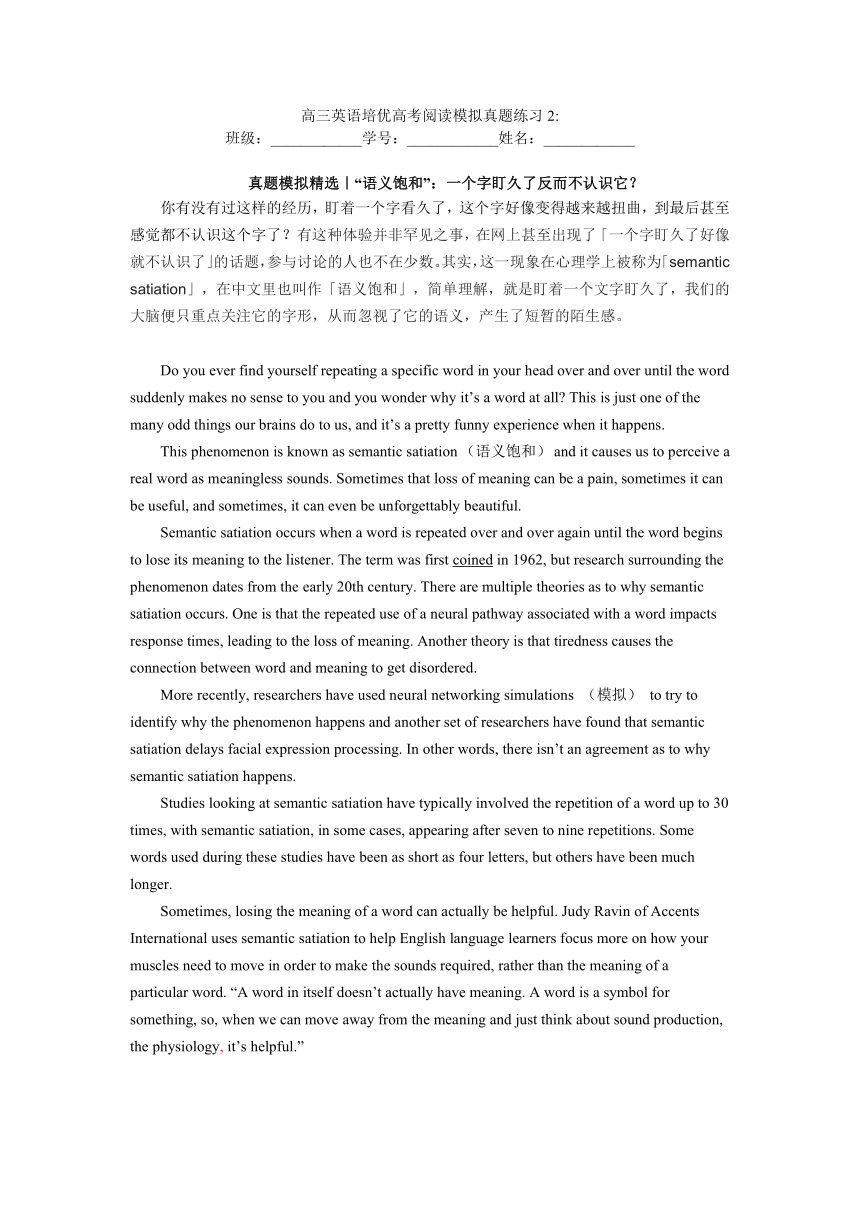
高三英语培优高考阅读模拟真题练习2: 班级:_____学号:_____姓名:_____ 真题模拟精选|“语义饱和”:一个字盯久了反而不认识它? 你有没有过这样的经历,盯着一个字看久了,这个字好像变得越来越扭曲,到最后甚至感觉都不认识这个字了?有这种体验并非罕见之事,在网上甚至出现了「一个字盯久了好像就不认识了」的话题,参与讨论的人也不在少数。其实,这一现象在心理学上被称为「semantic satiation」,在中文里也叫作「语义饱和」,简单理解,就是盯着一个文字盯久了,我们的大脑便只重点关注它的字形,从而忽视了它的语义,产生了短暂的陌生感。 Do you ever find yourself repeating a specific word in your head over and over until the word suddenly makes no sense to you and you wonder why it’s a word at all This is just one of the many odd things our brains do to us, and it’s a pretty funny experience when it happens. This phenomenon is known as semantic satiation (语义饱和) and it causes us to perceive a real word as meaningless sounds. Sometimes that loss of meaning can be a pain, sometimes it can be useful, and sometimes, it can even be unforgettably beautiful. Semantic satiation occurs when a word is repeated over and over again until the word begins to lose its meaning to the listener. The term was first coined in 1962, but research surrounding the phenomenon dates from the early 20th century. There are multiple theories as to why semantic satiation occurs. One is that the repeated use of a neural pathway associated with a word impacts response times, leading to the loss of meaning. Another theory is that tiredness causes the connection between word and meaning to get disordered. More recently, researchers have used neural networking simulations (模拟) to try to identify why the phenomenon happens and another set of researchers have found that semantic satiation delays facial expression processing. In other words, there isn’t an agreement as to why semantic satiation happens. Studies looking at semantic satiation have typically involved the repetition of a word up to 30 times, with semantic satiation, in some cases, appearing after seven to nine repetitions. Some words used during these studies have been as short as four letters, but others have been much longer. Sometimes, losing the meaning of a word can actually be helpful. Judy Ravin of Accents International uses semantic satiation to help English language learners focus more on how your muscles need to move in order to make the sounds required, rather than the meaning of a particular word. “A word in itself doesn’t actually have meaning. A word is a symbol for something, so, when we can move away from the meaning and just think about sound production, the physiology, it’s helpful.” 32. What can we learn from semantic satiation A. It has its origin from money. B. It is most likely to be painful. C. It arises as a word is repeated enough times. D. It’s one of the few tricks our brain plays on us. 33. What does the word "coined" in paragraph 3 probably mean A. Created. B. Saved. C. Earned. D. Collected. 34. How does J ... ...
~~ 您好,已阅读到文档的结尾了 ~~

